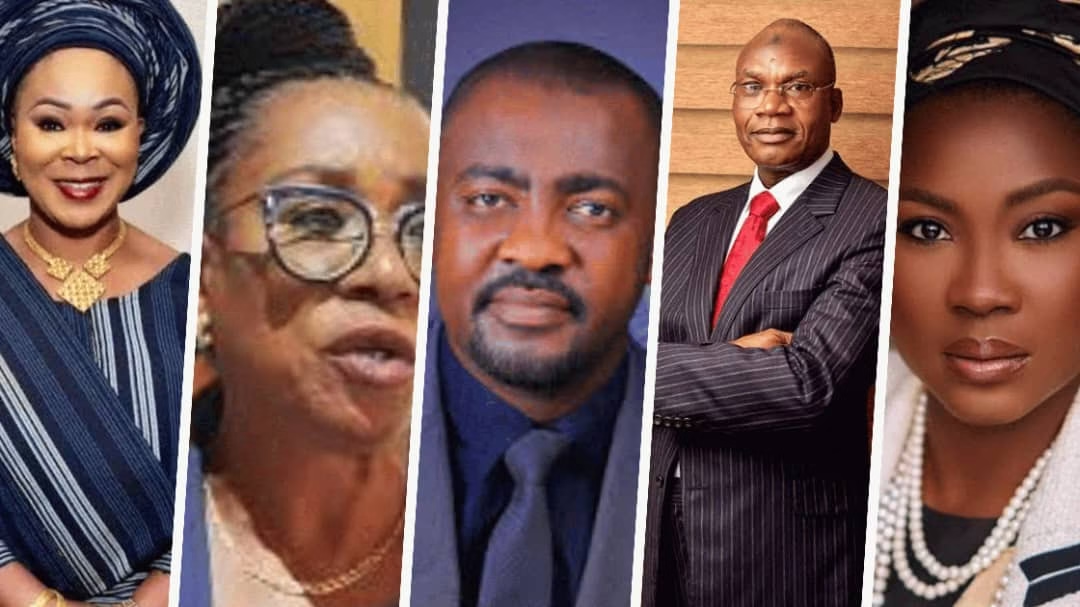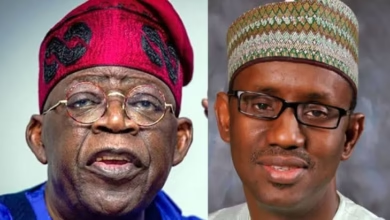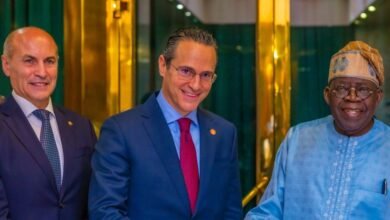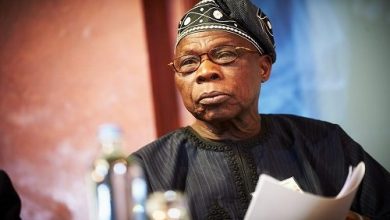
By Dayo Dare
In his pursuit of reform and accountability, President Bola Tinubu made swift and decisive changes to his cabinet of 45 ministers. In 2024, he sacked five members and reassigned 10 others. While the move struck many as unprecedented, the president framed it as a necessary antidote to Nigeria’s worsening economic woes.
Still, it’s hard to ignore the possibility that personal dissatisfaction played a role in the dismissals. Some insiders say these ministers had fallen out of favor with Tinubu, either for their underwhelming performance, media gaffes, or controversial conduct. Presidential adviser Bayo Onanuga confirmed the list of those removed.
1. Uju Kennedy-Ohanenye, Former Minister of Women Affairs
Uju Kennedy-Ohanenye is lawyer, entrepreneur, and film producer. She was the first woman to contest the APC presidential ticket in 2023 before stepping down for Tinubu. Her appointment as Minister of Women Affairs in August 2023 was seen by many as compensation.
Her time in office, however, was riddled with controversies. Just two months in, she threatened to sue the United Nations over alleged fund mismanagement. In Abuja, she disrupted two events she claimed had been organized without her consent, demanding that all programs under her ministry directly empower women.
Perhaps the most publicized episode was her lawsuit against Niger State’s government over plans to marry off 100 orphans. Though she eventually withdrew the case, citing collaborative investigations with traditional rulers, the damage was done. Her tenure was more reactive than effective and may have led to her dismissal.
Since her dismissal from the cabinet in October 2024, Kennedy‑Ohanenye has reignited her passion for film. In early February 2025, she released and produced the feature Hatred on her YouTube channel, marking her official return to Nollywood. She continues to build on her earlier work, including movies like Saving My Marriage, Royal Ploy, The Cow Girls, and collaborations with actors such as Segun Arinze and Ngozi Ezeonu.
2. Lola Ade-John, Former Minister of Tourism
With a background in banking and IT, Lola Ade-John brought tech-savvy credentials into her brief role as Minister of Tourism. She launched a national tourism policy, introduced an online database, and advocated for the inclusion of history in tourism education.
However, those gains didn’t offset her reported absences from the country. Critics claimed she was often unavailable and poorly prepared for public appearances, struggling with statistics and even “mumbling” when asked to name Nigeria’s top tourist sites. Ranked low in government assessments, her exit was less surprising than it was inevitable.
Following her dismissal in October 2024, she issued a graceful farewell letter to President Tinubu, reaffirming her commitment to the “Renewed Hope Agenda” and expressed appreciation to her ministry.
3. Prof. Tahir Mamman, Former Minister of Education
A Senior Advocate of Nigeria, Prof. Tahir Mamman began his career as a lecturer at the University of Maiduguri. After a failed bid for Adamawa State governor in 2014, he became APC’s National Vice Chairman in 2020 and later Minister of Education in 2023.
One of his most controversial policies was mandating that no one under 18 could sit for UTME or gain university admission. This sparked fierce backlash, with critics arguing it penalized advanced students. He also disqualified degrees from several Benin, Togo, Ghanaian, and even Western universities, barring thousands of Nigerians from NYSC service and triggering diplomatic tension.
Mamman’s tenure was further plagued by poor coordination among education agencies and allegations of favoritism, particularly the overrepresentation of his home state, Adamawa, in federal appointments.
Following President Tinubu’s cabinet reshuffle, there’s been no further public appointment or media mention of Professor Mamman in either government or private sector roles.
4. Abdullahi Gwarzo, Former Minister of State, Housing and Urban Development
Textie engineer and seasoned Kano politician, Abdullahi Gwarzo once served as Deputy Governor and earned the nickname “Ruwa Baba” for his work in water resources. His 2023 appointment to Tinubu’s cabinet ended abruptly in October 2024.
Gwarzo insisted his removal was political, not performance-based, claiming his dismissal was linked to the overrepresentation of Kano North in federal roles. However, watchdog groups like the Renewed Hope Ambassadors Forum (RHAF) accused him of leaking private conversations and disrespecting the presidency. These claims painted him as untrustworthy and ultimately incompatible with Tinubu’s expectations.
Since leaving office, Abdullahi T. Gwarzo has stayed visible through public endorsements, international engagement, and reflections on his dismissal.
5. Dr. Jamila Bio Ibrahim, Former Minister of Youth and Development
A medical doctor turned public servant, Dr. Jamila Bio Ibrahim served as Kwara State’s Special Assistant on SDGs before joining Tinubu’s cabinet in 2023. But her youth-centered ministry soon drew criticism.
Southwest youth groups slammed her town hall events as performative and disconnected from grassroots concerns. A spokesperson from the Tinubu Support Organization went further, saying she “doesn’t understand her responsibilities” and failed to meaningfully engage with young Nigerians, especially during key moments like the #EndBadGovernance protests.
She was also accused of paying ₦20 million twice to a single individual to recruit 50 youths for Tinubu’s one-year anniversary event, allegedly without involving her Minister of State. The payments raised serious questions about transparency and potential misuse of public funds.
Since leaving office, Dr. Jamila Bio Ibrahim has remained deeply active, building on her ministerial accomplishments by empowering youth at the grassroots, enhancing national programs like NYIF and NYSP, advocating for policy change, and maintaining a strong public profile.
President Tinubu’s cabinet reshuffle sent a clear message. Performance, accountability, and alignment with the administration’s broader vision are non-negotiable. For the five former ministers, their exit wasn’t just about policies or politics, it was about the president’s growing intolerance for inefficiency and drama.





